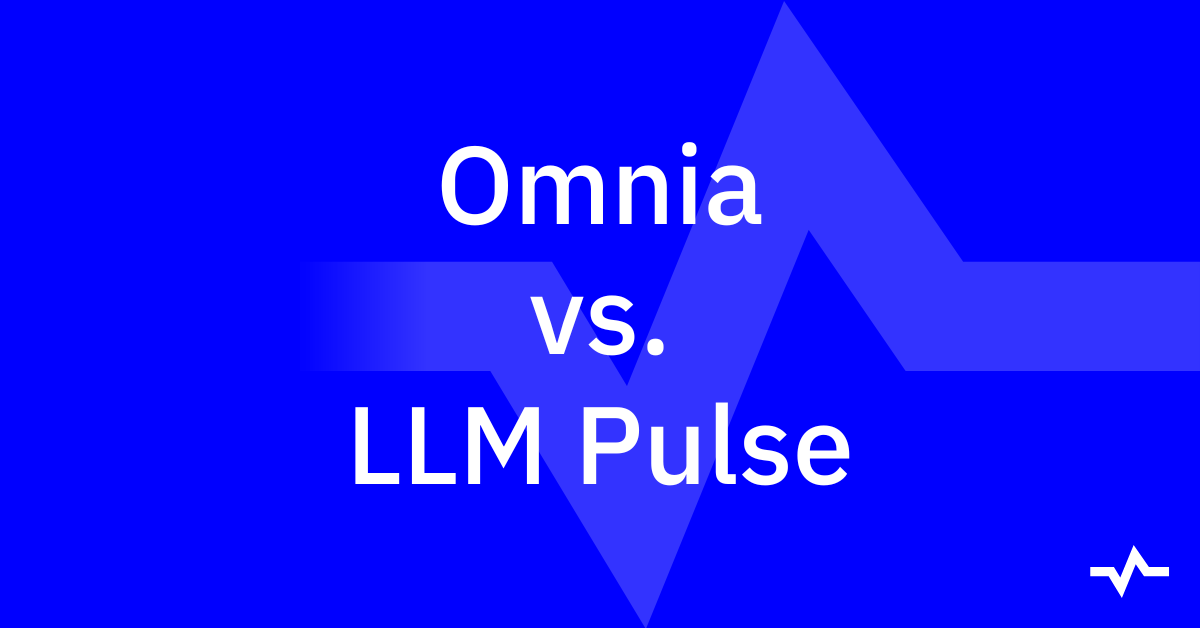In the past year, several tools have emerged to help brands understand how they appear in the new world of AI search. Two of the most talked about are Omnia and LLM Pulse. Both made in Spain.
Both share a common mission: bringing transparency to a search experience where results are no longer just “10 blue links” but AI-generated answers.
Table of Contents
In this post, we compare both platforms based on publicly available information from their websites as of January 2026. While Omnia has raised €3.5M in VC funding, LLM Pulse remains bootstrapped and has focused on shipping features instead of fundraising.
Background on both companies
About Omnia
Omnia is a Spanish startup led by Daniel Espejo (Founder & CEO) and Miguel Fernández (CTO). The project first appeared publicly in early 2025, with its official go-to-market phase starting around August–September 2025.
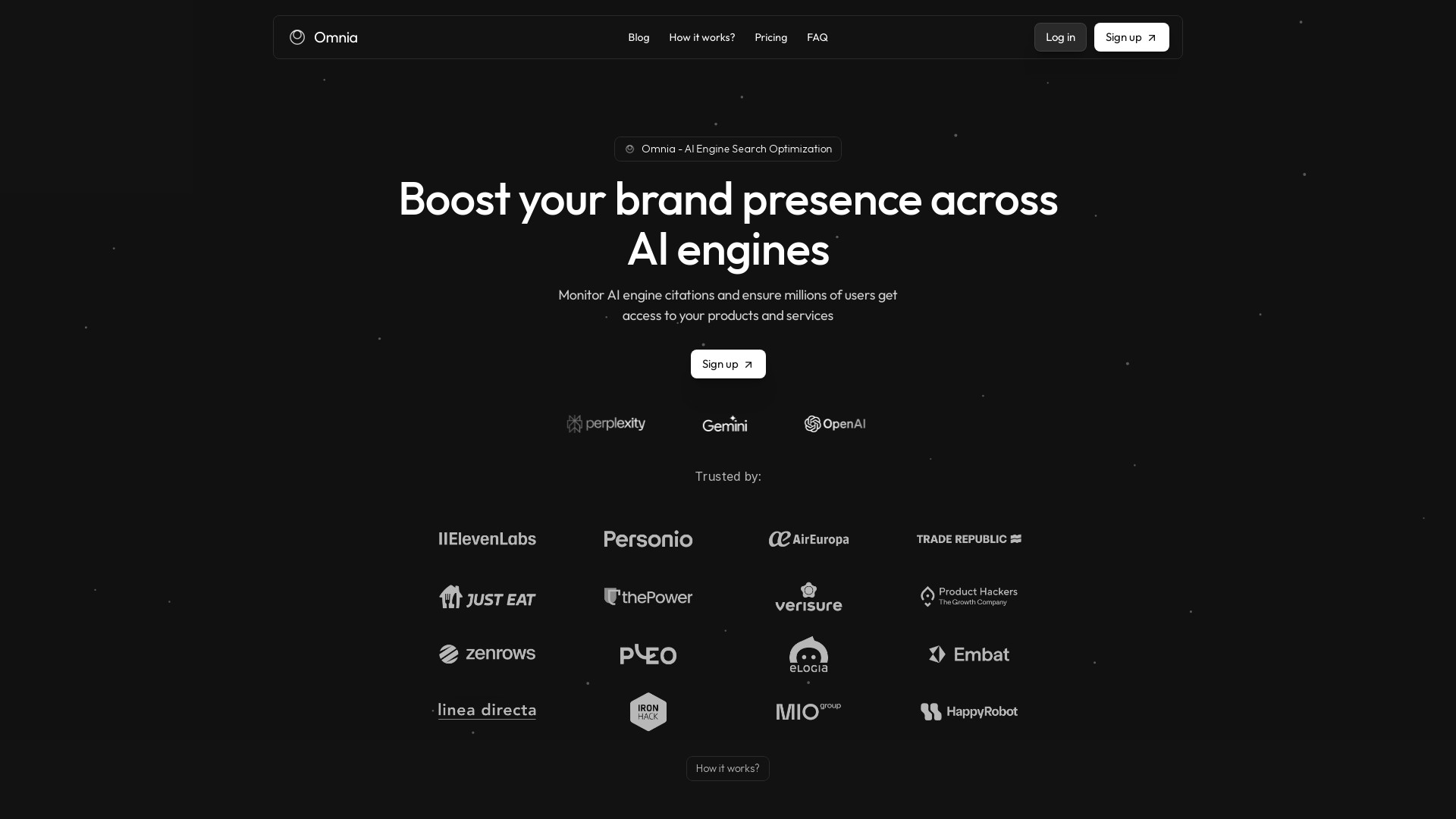
In October 2025, Omnia announced a €3.5 million pre-seed round led by Visionaries Club, with participation from KFund, Baobab Ventures, and angel investors including Carles Reina (ElevenLabs), Paulo Rodriguez (Vanta), and Hugo Arévalo (ThePower).
About LLM Pulse
LLM Pulse is a 3-founder project led by Daniel Peris, Esteve Castells, and Adrián Rojas. The team publicly introduced the product with a “HELLO WORLD” post on July 28, 2025, noting they had actually gone live two weeks earlier—on Tuesday, July 15, 2025.
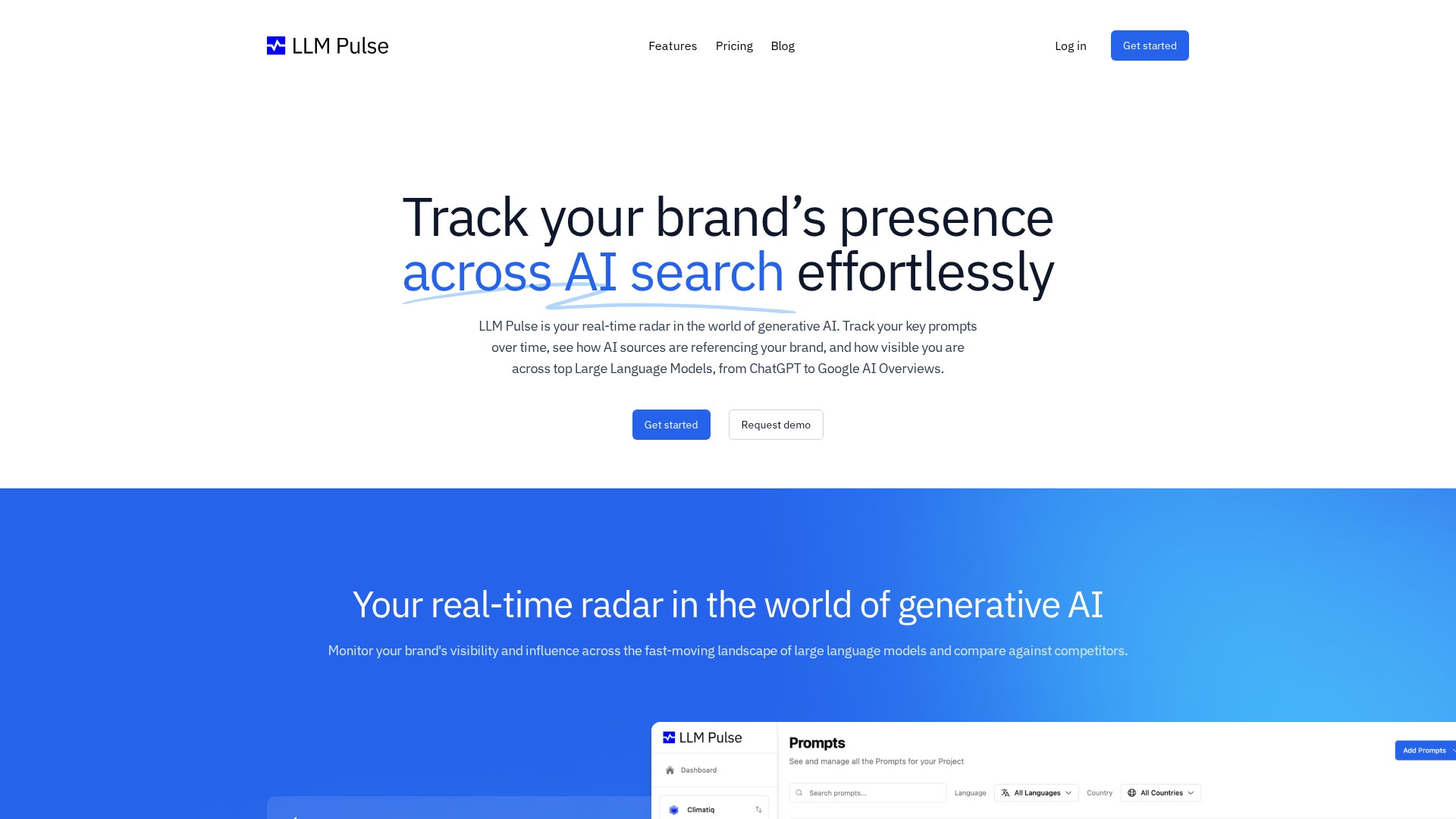
The LLM Pulse team brings many years of combined experience in SEO, SaaS, and AI-related product development.
On funding, the founders state they are bootstrapped—”no outside funding, just time and focus.” This has allowed them to focus entirely on building features customers actually need, rather than chasing investor milestones.
Today, LLM Pulse is used by 500+ brands across multiple industries—including fintech, marketplaces, SaaS companies, and marketing agencies—in different countries around the world.
Short overview
Omnia positions itself as an “AI engine search optimization” platform. It monitors mentions and citations across ChatGPT, Perplexity, Google AI Overviews, and Google AI Mode. It tracks brands vs. competitors and offers daily monitoring. Topic discovery is available, but sentiment analysis and data export are still listed as “coming soon” — over 5 months after their go-to-market launch.
LLM Pulse is a comprehensive AI search visibility platform with 20+ features already live. It captures full LLM answers (including mentions and citations), provides competitive benchmarking, Share of Voice, prompt suggestions, Content Intelligence, Web Analytics integration, API access, Looker Studio connector, and App Store citations tracking. It tracks ChatGPT, Perplexity, Gemini, Google AI Mode, and Google AI Overviews. Brand Sentiment has been live since mid-2025.
Both tools work for any country and language.
Common ground
- Both tools allow brands to track mentions and citations (websites / URLs) across AI models.
- Both seek to bring clarity to a fast-changing search landscape.
- Both help marketing, comms and PR teams identify opportunities.
Feature comparison: what’s actually live?
This is where the platforms differ significantly. While both promise similar outcomes, the gap in shipped features is substantial.
LLM Pulse features (all live)
- Tracking & analytics: Prompt tracking, brand visibility scores, citation sources analysis, sentiment tracking, models comparison, web analytics integration
- Content & intelligence: Content Intelligence, content recommendations
- Discovery & research: AI prompt suggestions, prompt research, query fan out, reputation monitoring
- Platform & integrations: API access, Looker Studio connector, tags, app store citations tracking
- Extra services: One-time prompt research, white label, Chrome extension (Query Detector for ChatGPT)
- Free tools: AI Visibility Report
Omnia features
- Topic discovery
- Brand performance monitoring
- Citation tracking
- Daily monitoring
- Sentiment analysis: “coming soon”
- Data export: Pro plan only (€279/month)
Omnia vs. LLM Pulse: plans, features & pricing
Omnia
| Plan | Main Inclusions | Notes |
|---|---|---|
| Growth – 79€/mo | Up to 25 prompts; unlimited countries/languages; brand + competitor tracking; citation monitoring; supports ChatGPT, Perplexity, Google AI Overviews; daily monitoring. | Transparent entry-level option; 14-day free trial; some features still “coming soon” (e.g. sentiment, data export). |
| Pro – 279€/mo | Up to 100 prompts; everything in Growth plus Slack support; premium functions listed (some “coming soon”). | Higher capacity and closer support; significant price increase. |
| Enterprise – from 499€/mo | 200+ prompts; dedicated account manager (24h SLA); tailored setup. | Geared toward larger organizations; price depends on scope. |
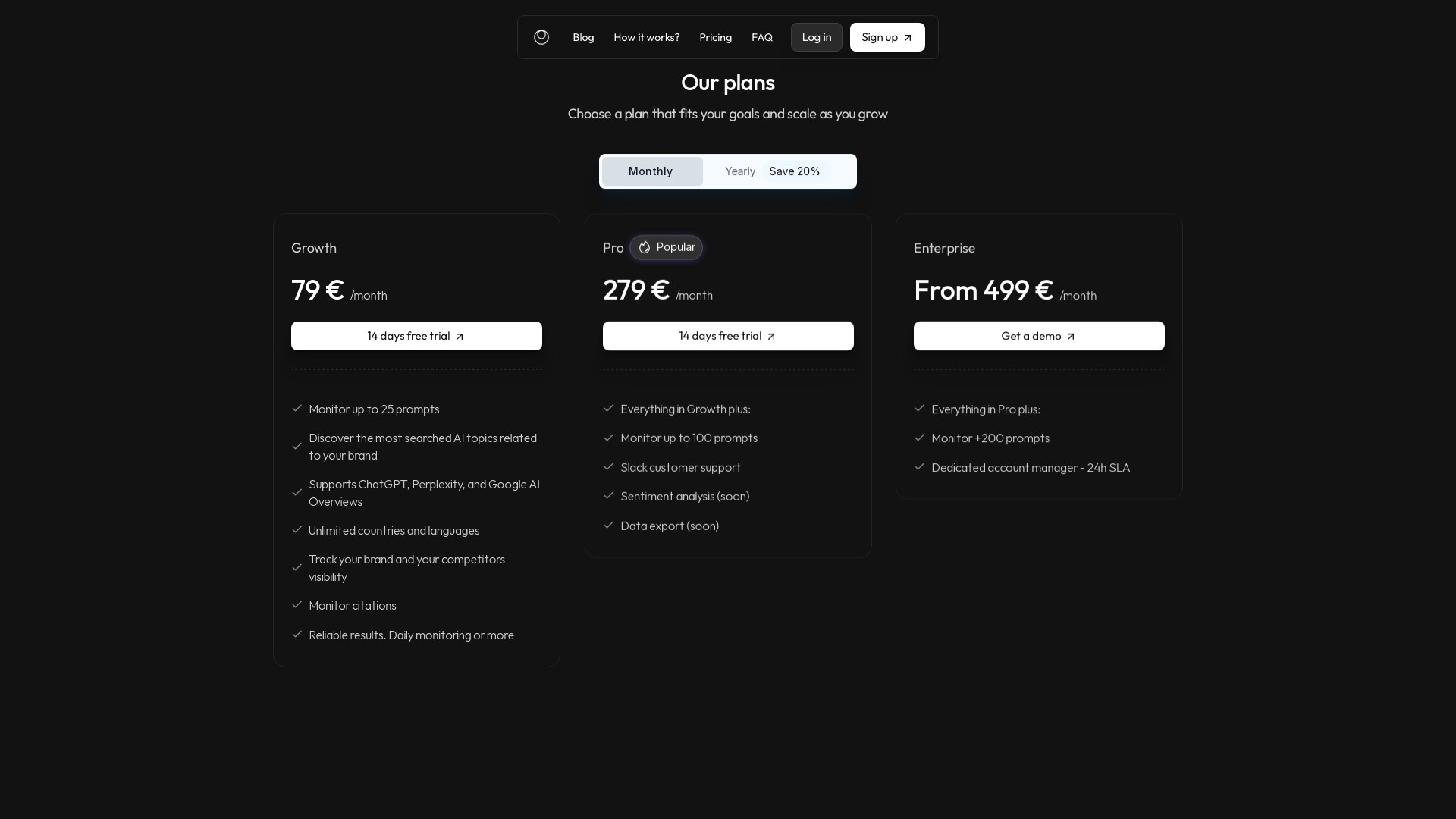
LLM Pulse
| Plan | Main Inclusions | Notes |
|---|---|---|
| Starter – 49 €/mo (or 490 €/year ≈ 40.83 €/mo) | 1 project; 40 tracked prompts; 40 responses/week per model; weekly tracking; 5 competitors; unlimited team members; covers ChatGPT, Perplexity, Google AI Mode, Google AI Overviews. | Lowest entry price; suitable for individuals or small teams. |
| Growth – 99 €/mo (or 990 €/year ≈ 82.50 €/mo) | 2 projects; 100 tracked prompts; 100 responses/week per model; weekly tracking; 10 competitors; unlimited team members. | Balanced option for growing teams. |
| Scale – 299 €/mo (or 2,990 €/year ≈ 249.17 €/mo) | 5 projects; 300 tracked prompts; 300 responses/week per model; weekly tracking; 15 competitors; unlimited team members. | Best fit for mid-size organizations. |
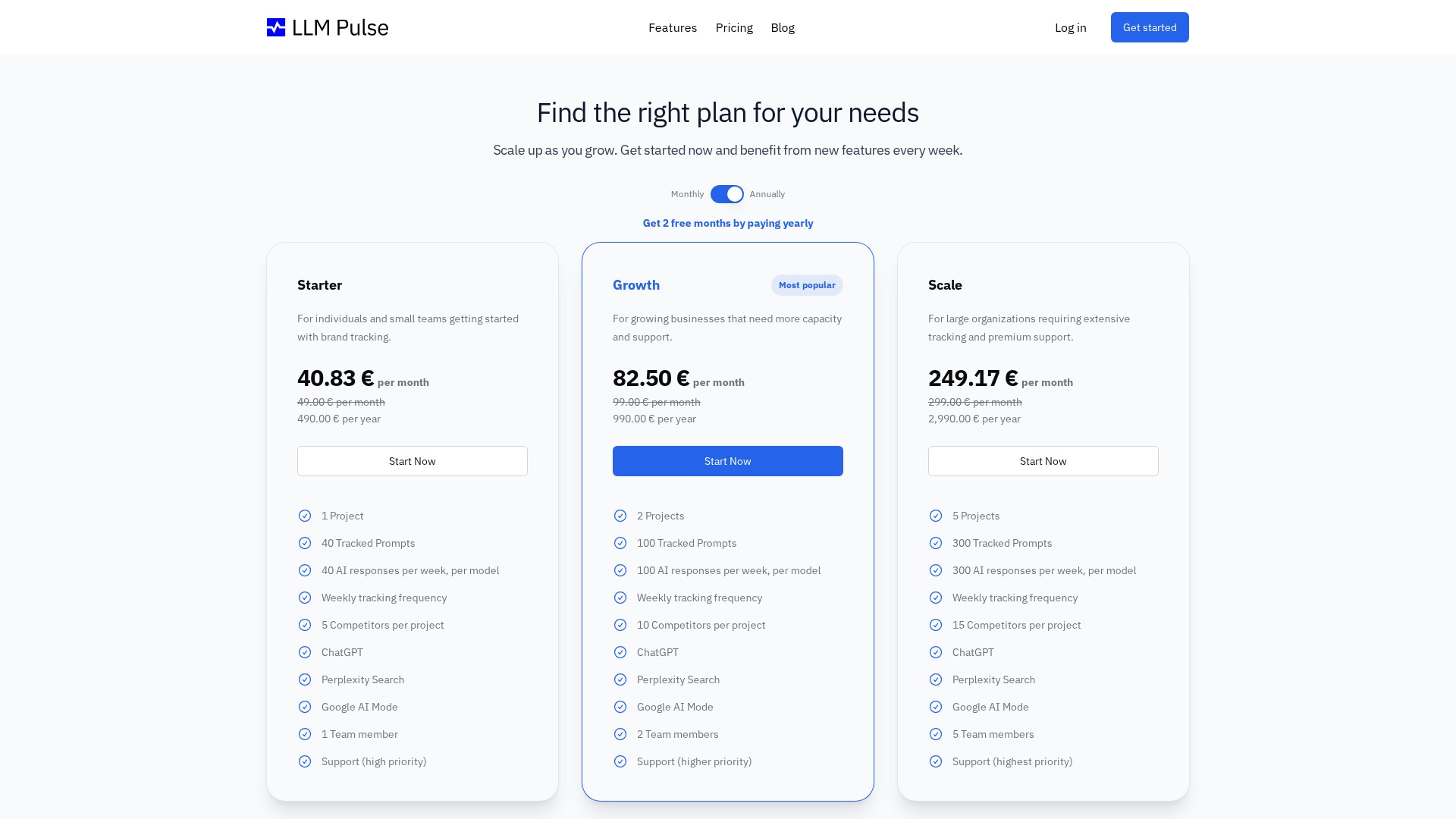
LLM Pulse also offers (much) larger plans with more projects, more prompts, more team members, on-demand models, and white label options.
Key takeaways
- Entry-level pricing: LLM Pulse starts at 49€ (40 prompts) vs Omnia at 79€ (25 prompts) — that’s 61% more prompts for 38% less money.
- Cost per prompt: LLM Pulse = €1.23/prompt. Omnia = €3.16/prompt. LLM Pulse is 2.6x more cost-effective.
- AI models: LLM Pulse includes Gemini on all plans. Omnia does not mention Gemini.
- Team members: LLM Pulse offers unlimited team members on all plans. Omnia doesn’t specify limits.
- Data exports: Included in all LLM Pulse plans. Omnia requires Pro (€279/month).
- Sentiment analysis: Live on LLM Pulse since mid-2025. Still “coming soon” on Omnia.
- Integrations: LLM Pulse has Looker Studio connector and API access. Omnia has API docs but no Looker Studio.
Where LLM Pulse has a clear lead
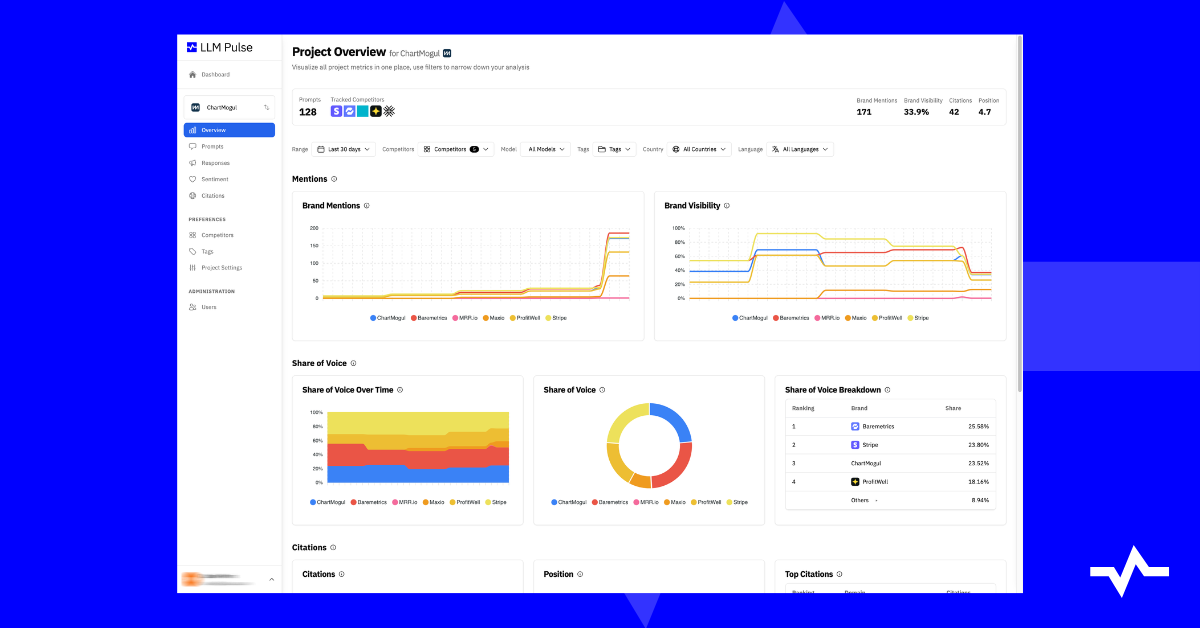
- Model coverage: 5 models (ChatGPT, Perplexity, Gemini, Google AI Mode, Google AI Overviews) vs Omnia’s 4 (no Gemini).
- Sentiment analysis: Live and included in all plans since mid-2025. Omnia has promised this for months with no delivery.
- Data exports: CSV and Excel exports on all plans. Omnia gates this behind their €279/month Pro plan.
- Looker Studio: Native connector for custom dashboards and client reporting. Omnia doesn’t offer this.
- API access: Available for enterprise integrations and custom workflows.
- App store tracking: Monitor citations in iOS App Store and Google Play.
- Web analytics integration: Connect AI visibility data with your analytics stack.
- Content intelligence: AI-powered content recommendations based on visibility gaps.
- Query fan out: Automatically expand tracked prompts to cover variations.
- White label: Available for agencies to brand as their own.
- Chrome extension: Query Detector for ChatGPT to discover what people actually search.
- Free AI visibility report: Get a snapshot of your brand’s AI visibility without signing up.
- Unlimited team members: Collaborate without per-seat pricing.
- Transparent limits: Clear weekly response caps per model published on pricing page.
Where Omnia currently positions itself
- Daily monitoring by default: Omnia emphasizes daily tracking cadence.
- Topic discovery: Highlights “discover the most searched AI topics related to your brand” in their Growth plan.
- VC backing: €3.5M funding may appeal to enterprise buyers who prioritize vendor stability over feature depth.
The “coming soon” problem
One pattern we’ve observed: Omnia has listed sentiment analysis and data export as “coming soon” since at least September 2025. As of January 2026, these features remain unavailable on their Growth plan.
At LLM Pulse, we shipped sentiment analysis in our first months and have continued releasing new features weekly. When you’re bootstrapped, you ship or you die. There’s no runway to coast on.
Daily vs. weekly tracking: what actually matters
Omnia promotes daily monitoring as a key differentiator. Here’s our perspective:
When it comes to AI visibility, changes from one day to the next are usually small. This is especially true in Google AI Mode, which external analyses show to be more stable than AI Overviews.
In our experience, looking at the data on a weekly basis gives the clearest picture. It avoids the noise of minor daily fluctuations and provides the right balance for making strategic decisions.
Weekly insights are enough to guide messaging, content, and citation strategy. Daily tracking still has its place—for example, during specific campaigns or crisis monitoring—but for long-term brand visibility, it rarely changes the outcome.
LLM Pulse offers daily tracking on demand for teams that need it. We just don’t believe it should be the default for everyone.
Which tool is right for you?
Choose LLM Pulse if you need…
- More features today: 20+ features live, not on a roadmap.
- Sentiment analysis: Available now, not “coming soon.”
- Better value per prompt: 2.6x more cost-effective than Omnia.
- Gemini coverage: Included in all plans.
- Data exports without upselling: CSV/Excel on all plans, not locked to €279/month.
- Looker Studio integration: Build custom dashboards and client reports.
- API access: Integrate with your existing tech stack.
- App store tracking: Monitor citations beyond web.
- White label options: For agencies building client-facing products.
- Unlimited team members: Collaborate without per-seat pricing.
- A team that ships weekly: We release new features constantly because our users demand it.
Consider Omnia if…
- You specifically need daily monitoring as the default.
- You’re interested in topic discovery as a primary use case.
- You prefer VC-backed vendors for procurement reasons.
- You’re willing to wait for sentiment analysis and don’t need data exports on lower tiers.
Final words
We built LLM Pulse because we saw a gap in the market: teams needed deep AI visibility analytics, not just surface-level tracking. While others have raised millions and promised features “coming soon,” we’ve focused on shipping.
The numbers speak for themselves:
- 20+ features live vs ~6 on Omnia
- 5 AI models vs 4
- €1.23 per prompt vs €3.16
- Sentiment live since mid-2025 vs “coming soon” for 5+ months
- Data exports on all plans vs Pro-only (€279/month)
- Unlimited team members vs unspecified
If you’re evaluating AI visibility tools, we’d encourage you to try both. Start a free trial on LLM Pulse and see the difference for yourself. The best tool is the one that ships what you need today, not what’s promised on a roadmap.

